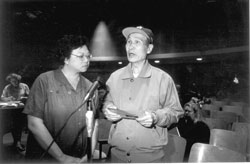By Albert Amateau
Lower East Side and Chinatown organizations and residents this week urged the Neigborhood Advisory Board to recommend federal funding in the coming year for a variety of community-based agencies that serve poor areas.
Housing and tenant protection and services for youth, seniors and immigrants led the priorities of the 85 people who attended the April 28 meeting of the District 3 board, which advises the city Department of Youth and Community Development on which groups to fund from the federal anti-poverty Community Development Block Grants established in 1964.
Currently, about $545,000 goes to 11 agencies whose programs serve about 2,800 clients in the district between E. 14th St. and the Brooklyn Bridge and from the east sides of Fourth Ave., Bowery, Baxter and Pearl Sts. to the East River.
The board, half of whose members are appointed by local elected officials and half by the D.Y.C.D., will make their recommendations this autumn. But the amount of money that will be available has not yet been determined, according to Michael Ognibene, D.Y.C.D. assistant commissioner.
Citywide, $17 million of the federal anti-poverty funds go to service organizations in 44 of the city’s 59 community board districts. The areas are determined by figures showing the number of residents in each census tract whose incomes are below 125 percent of the poverty level. Of the 164,407 residents in the District 3 area, 35.6 percent have incomes 125 percent below the poverty level, according to D.Y.C.D.
Robert Caballero, a former member of the planning board, called on the board and the city to fund all organizations equally, with new organizations funded at a lower level for a trial period. He also said that funding should reflect the ethnic and racial diversity of the Lower East Side.
Allen Bortnick, an associate of Caballero, accused the advisory board of operating in “an atmosphere of secrecy” and failing to publicize the annual meeting. “These hearings should take place more often,” he added. Bortnick also suggested that groups that have been funded for many years could be dropped in favor of new organizations, but he did not specify which might be dropped.
A D.Y.C.D. spokesperson said later that the April 28 meeting at P.S. 15 on E. Fourth St. had been publicized at Community Board 3 meetings and by handbills posted in the district.
Israel Perez, a resident of the Baruch Houses, criticized the way the advisory board is appointed. “The board has been hijacked by elected officials,” he said, noting that his own application for membership to the board has been ignored.
Margaret Hughes, representing Good Old Lower East Side (GOLES), and Margaret Chin of Asian Americans for Equality urged renewal of their funding for next year, as did Laura Sharp of Visiting Neighbors. Martha Polack of the United Jewish Council of the Lower East Side thanked the board for past funding and urged that U.J.C. senior services and tenant advocacy programs were especially important during an era of city budget cuts.
Chang Yu Chin, a 79-year-old resident of Chinatown, speaking through an interpreter, told the board that he depends on entitlement and housing services for seniors that are provided by the Greater Chinatown Community Association and Asian Americans for Equality.
Gerard Schrippen, a member of Manhattan Neighborhood Council and a teacher at Washington Irving High School, urged the board to give priority to groups that help youth and young adults prepare for jobs. He also called on the board to fund groups that train tenants to hold onto their homes.
A plea for funding for the Girls Club of the Lower East Side came from Mazie Torres. Edward Garcia asked for help with his sports program for youth in the Valdese Houses and to train teens and young adults for jobs.
Pablo de Filippi, executive director of the Lower East Side Peoples Federal Credit Union on Avenue B, said that financial services and credit are essential to help poor people and immigrants get out of poverty.
Dustin Penland, of Trinity Community Church, 138 Henry St., asked for funding for a center called “Say Yes” that counsels students at risk of dropping out of school and their parents.
A plea for help for the 85 community gardens in the district came from Irmgard Taylor, an advocate for the Ninth St. Community Garden. Tom Toth and Diana Lakis, members of Friends of Seward Park, told the board about the movie nights and sports programs that the Friends sponsor and asked to be considered for funding.
City Councilmember Alan Gerson thanked board members for their volunteer service and urged residents to participate in deliberations. “We need neighborhood advice on how to make sure that our needs are met,” he said.
The board includes Harold Stelter of Community Board 3; Chris Hamilton, a Columbia St. resident; Jacob Goldman, a member of Community School Board 1; Rabbi Y.S. Ginsberg; Dahlia Soto; Diane Orr; Samuel Vasquez, newly appointed by Gerson; and Nancy Colon, board chairperson who was unable to attend the April 28 meeting.






























